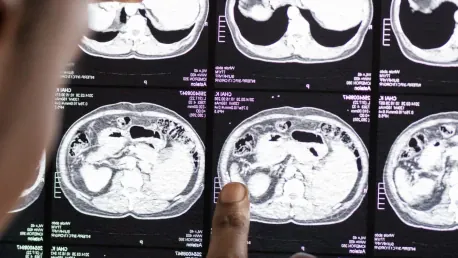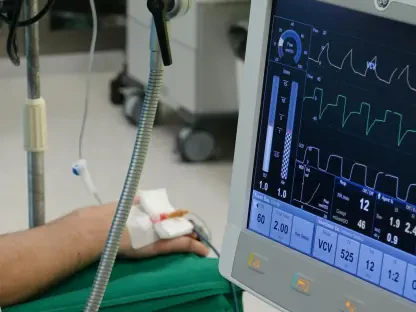The 2024 annual meeting of the Radiological Society of North America brought together a diverse group of healthcare professionals to discuss the latest trends and research in radiology. Held from December 1 to 5 in Chicago, this event was a convergence point for radiologists, radiation oncologists, physicists, and other healthcare experts. The central focus of many presentations was the impact of modern medications and lifestyle products on human health. Two standout studies raised important questions about long-term health implications: the impact of levothyroxine on bone health in older adults and the vascular effects of electronic cigarettes (e-cigarettes). These findings not only provide valuable insights but also emphasize the urgent need for further research to understand the broader consequences of these substances.
Levothyroxine and Bone Health in Older Adults
A significant observational study offered by Elena Ghotbi, M.D., from Johns Hopkins University School of Medicine, explored the relationship between levothyroxine usage in older adults and bone health. Utilizing data from the Baltimore Longitudinal Study of Aging, the study observed that individuals prescribed levothyroxine exhibited notable loss of total body bone mass and bone density. This was observed even in those with thyroid-stimulating hormone (TSH) levels within the normal range. Despite the association with bone loss, the study found no significant increase in clinically low bone density conditions such as osteoporosis. This anomaly raises critical questions about the appropriate prescription of thyroid hormone in those without a clear indication for its use.
The study’s findings invite a larger conversation between healthcare providers and patients regarding the suitability of levothyroxine prescriptions. The evidence suggests that some older adults may be receiving levothyroxine without a medically necessary rationale. Further research, including randomized trials, is imperative to determine the long-term musculoskeletal risks posed by this medication. Understanding the broader implications of extended medication use is crucial, especially for older populations who are more susceptible to bone density loss and other related complications. Ensuring that medications like levothyroxine are prescribed only when absolutely necessary is essential for optimizing patient outcomes.
Neurological Impacts of Concussions
Another critical study from the meeting focused on the neurological impacts of concussions, presenting a new perspective on brain health following head injuries. Conducted by Kevin C. Yu from Wake Forest University School of Medicine, the research utilized magnetoencephalography data collected from adolescent participants. The study discovered a link between concussions and reduced cortical excitability in the frontal cortex, a region of the brain that plays a crucial role in cognitive functions like attention and problem-solving. These changes in brain activity were correlated with worse cognitive symptoms, as measured by the Post-Concussive Symptom Inventory, highlighting the detrimental impact of concussions on mental performance.
The study underscores the importance of closely monitoring adolescents’ brain activity following head injuries and advocates for stricter protective measures in sports. Adequate recovery time and careful clinical monitoring are essential to prevent further complications. This research emphasizes the need for comprehensive intervention strategies to mitigate the long-term effects of concussions, particularly in young adults. Given the increasing prevalence of sports-related head injuries, these findings underscore the necessity for policy changes that prioritize athlete safety and adequate post-injury care. The long-term cognitive health of individuals, particularly adolescents, is paramount, and preventing further damage through proactive measures is critical.
Visceral Adipose Tissue and Alzheimer’s Disease
Mahsa Dolatshahi, M.D., from the Mallinckrodt Institute of Radiology, presented a study that unveiled a new understanding of obesity and its link to Alzheimer’s disease. This research investigated the role of visceral adipose tissue (VAT) in Alzheimer’s pathologies by examining cognitively normal middle-aged individuals. The study utilized a combination of brain positron emission tomography (PET), body MRI, metabolic assessments, and blood lipid level evaluations to draw its conclusions. The researchers found that VAT mediates the relationship between high body mass index (BMI) and amyloid deposition in the brain, which is connected to early tau pathology, independent of BMI itself.
This finding advocates for looking beyond BMI as the sole indicator of obesity-related health risks. Specifically, visceral fat appears to play a distinct role in Alzheimer’s disease pathologies. By focusing on reducing visceral adiposity and managing dyslipidemia, there could be potential improvements in brain health outcomes. The study calls for further longitudinal and interventional research to explore lifestyle and social determinants influencing obesity and their subsequent impact on Alzheimer’s risk. Understanding the unique role of different types of body fat can help in the development of targeted interventions aimed at reducing the risk of neurodegenerative diseases. This nuanced view of obesity could pave the way for more effective treatment strategies and preventative measures.
Vascular Effects of Electronic Cigarettes
A noteworthy study conducted by Marianne Nabbout, M.D., from the University of Arkansas for Medical Sciences shed light on the vascular impacts of electronic cigarette inhalation. The study utilized quantitative MRI to compare the vascular function among individuals who smoked tobacco and those who vaped either nicotinized or non-nicotinized e-cigarettes. Results indicated that both types of e-cigarette use caused a significant decrease in venous oxygen saturation in the superficial femoral vein and altered the forward flow time in the superficial femoral artery. This suggests an immediate decline in the lungs’ ability to uptake oxygen and a significant decrease in resting blood flow velocity.
The implications of these findings are profound, indicating that e-cigarettes, even without nicotine, can have acute and measurable effects on the vascular system. Harmful components apart from nicotine likely contribute to these vascular changes, warranting caution in the use of e-cigarettes. The ongoing study aims to confirm these findings with a larger sample size. Additional research into the long-term vascular effects of e-cigarette use is essential, as these preliminary results suggest considerable risks associated with vaping. Public health policies and preventative measures should consider these potential hazards to mitigate the long-term health impacts of e-cigarette use.
Lung and Brain Function Post-COVID-19
Keegan Staab from the University of Iowa presented a study on the link between lung and brain function in long COVID patients. The research aimed to understand why symptoms like shortness of breath and cognitive issues persist after a COVID-19 infection. By using hyperpolarized xenon MRI to assess pulmonary gas exchange and structural and functional brain MRI to evaluate cognitive function, researchers found a connection between impaired lung gas exchange and cognitive deficits. This challenges the idea that post-COVID cognitive issues are purely psychological, suggesting that physiological lung abnormalities may play a role.
These findings offer a new perspective on long COVID, indicating that ongoing cognitive deficits might be due to physiological problems, not just psychological ones. Fully understanding long COVID’s impact is vital for developing effective treatments. The research underscores the importance of examining the long-term effects of COVID-19 on both lung and brain function. Thorough assessments and targeted treatments are necessary to address the complex nature of long COVID symptoms, aiming to enhance the quality of life for those affected.
The 2024 annual meeting of the Radiological Society of North America highlighted crucial research on modern health challenges. Studies on the impact of levothyroxine on bone health, the immediate vascular effects of e-cigarettes, and the link between visceral fat and Alzheimer’s provide valuable health insights. These findings, with continued research and targeted interventions, have the potential to shape future healthcare, emphasizing patient-centered care and innovative research.









